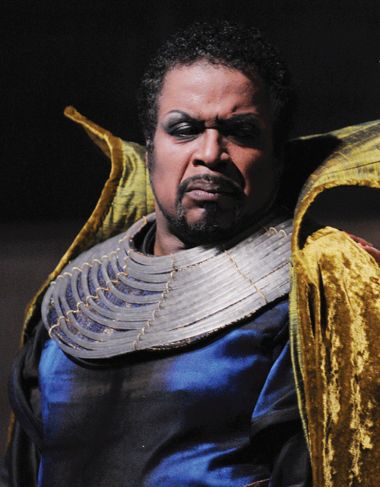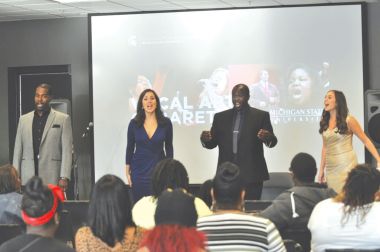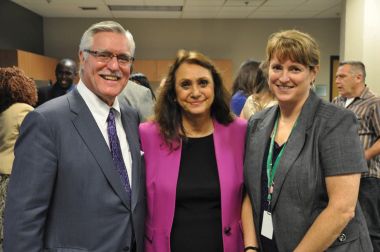Detroit High School Students and World Class Opera
- Mark Rucker
- Professor of Voice
- College of Music
- Sadie Rucker
- Pianist and Vocal Arts Outreach Program Coordinator
- College of Music

Mark Rucker performs as the High Priest in Saint-Saëns's Samson and Delilah.
"I didn't think I would get that kind of feeling," said Mark Rucker, world-renowned baritone and professor of voice in MSU's College of Music. Although Rucker has had a celebrated career performing on the world stage, those words describe the love he now has for watching students develop into musicians in their own right. It's not a surprise. His own life was changed by a dedicated music teacher.
Growing up and attending school in Southside Chicago, singing opera was not on his radar. Playing football was. But a vocal arts teacher at Chicago's Kenwood Academy, Dr. Lena McLin, whom Rucker describes as a "miraculous individual," heard him humming along to the Carpenters one day, and, in his words, "blackmailed" him into joining choir. And in 2004, when he made his Metropolitan Opera debut, she was in the front row.
After 34 years of traveling and performing on stages all over the world, Mark Rucker and his wife Sadie—also a professional musician—came to MSU in 2016, where Mark accepted a position as a professor of voice and Sadie became the vocal arts outreach coordinator for the College of Music. Together, they run the Vocal Arts Initiative, an outreach program started by College of Music dean James Forger, that gives vocal arts graduate students the opportunity to perform for and interact with music students in several Michigan high schools each semester, including in Detroit.
The highlight of the outreach program is a cabaret-style performance. It begins with a 45-minute vocal performance by the graduate students, with selections from opera, musical theatre, and spirituals. The last song is, "Sit Down, You're Rockin' the Boat," from Guys and Dolls, in which the high school students have the opportunity to sing along with the college students. "What usually happens at first is they're very shy in responding to this," said Sadie. "And then Mark will come down, and get them riled up and say, 'I can't hear you!' And then they'll get on their feet and they'll sing. So it's really fun!"
At the beginning of each semester, Sadie helps the graduate students make their music selections, based on their vocal ranges and preferences, and puts together a high caliber program with a variety of styles that will challenge both the graduate students and the high school students. This includes opera selections sung in their original languages. "She doesn't play down to them," said Mark Rucker. "It's amazing how much the kids like the opera. Her goal is to feed them music that they might not ever hear."

Rucker works with a voice student at the Detroit School of Arts.
It truly is a team effort. While the graduate students are performing, Sadie is accompanying and Mark is directing the scenes. "Mark is brilliant about it," said Sadie. "Because he's the singer and actor, he directs the clips and the scenes, which is beneficial not only for the audience, but also for the singers. You really get kind of a mini class in acting."
The performance section is followed by a 15-minute time for questions and answers. "There's a give and take between the singers and the students, which is really very good," said Sadie. "The kids ask all kinds of interesting questions. Some are deeper than others and some are silly. But it's kind of fun that they feel engaged."
In October 2016, only about a month after arriving at MSU, the Ruckers, along with four graduate students, were already performing their first cabaret, using the MSU Community Music School in Detroit (CMS-Detroit) as their venue. Participants of all ages attended this initial event, including parents, teachers, and other community members, as well as students from the Community Music School Gospel Choir and the Detroit School of Arts vocal arts program.
Jill Woodward, director of the CMS-Detroit, was instrumental in making arrangements for that first performance. "Anytime we can take advantage of the resources of the College of Music, we'll bend over backwards," said Woodward. "So we put out the word to all of our families, saying this is a really special opportunity for you to come and hear some amazing voices, but also talk to these graduate students about careers in music, and what's required, and how does a person get there? How can you dream big and pursue your dream? All of that was very exciting!"
Connections, Conversations, and Dedication

Left to Right: MSU graduate students Brian Major, Jenna Washburn, Jonathan Walker, and Laura Broscow perform in the Vocal Arts Cabaret at the MSU Community Music School–Detroit.
Woodward has been professionally invested in the City of Detroit for many years, and the cabaret impressed her. "It was really an amazing event," she said. "I spent 15 years at the Detroit Symphony Orchestra, and got to hear a lot of amazing voices over my years there, and I can tell you that the quality of the voices that Professor Rucker brought here were every bit as astounding. It was the kind of event that sends a shiver up your spine."
That first cabaret performance at CMS-Detroit enabled the Ruckers to make wonderful connections with music teachers in Detroit, including Cheryl Valentine, vocal arts director at the Detroit School of Arts. After the CMS-Detroit cabaret performance, Valentine, along with former arts director for Detroit Public Schools, Willie McAllister, began to work with the Ruckers on plans to host the cabaret at the Detroit School of Arts, which they did in March 2018, with teachers and students from Cass Technical High School and Martin Luther King High School also in attendance.
Valentine says her students really enjoy interacting with the college students. "One thing they talk about is the friendliness of the folks coming to perform and being able to talk and to network with them without having to go through the diva kind of thing," she said. "They enjoy just being able to sit down and have a conversation with them, and finding out how they got where they're going and what they need to do to prepare for that."
For the MSU graduate students, the feeling is mutual. Brian Major, baritone, has been part of the cabaret since 2016. He enjoys seeing how the program can open up opportunities for the kids. "Many of the students have not been exposed to classical singing or music, and if they have, not at the level that it's presented in the cabaret," said Major. "Although some of the music is in foreign languages, it's still relatable and touches the audiences to the core. Knowing that through our program we have impacted so many lives for the better is the true essence of what this program means."
As a long-time music teacher, Valentine often sees this impact first-hand. "I like to see the kids expand themselves, to see them bloom into what they can be in music; and not just in music, but in life, period. Seeing the change, the metamorphosis occur, is what gets me going," she said.

MSU College of Music Dean James Forger with Sadie Rucker and Community Music School–Detroit Director Jill Woodward.
She believes programs like the cabaret are part of this change. "Because the kids live in a box, and they need to see that there's light outside of the box," she said. "And the only way to see that light is somebody bringing it to you, and saying, 'OK, these are the things you can do as well.' And I think the biggest part of the cabaret is the fact that at the end, the kids get a chance to sing with them. That lets them know they can also do what they see on stage. We love it! When they come, the kids are like sponges. They're just pulling all kinds of stuff out of it."
In a follow-up survey, one of her students, Alaska, summed it up, "I honestly liked all of the musical selections because the tone and the beauty just spoke to me!"
Watching the MSU students interacting with this upcoming generation of high school students gives Mark Rucker tremendous satisfaction. "I get more of a charge, now, in teaching than I do in singing," he said. "When I go with these guys to see them perform in the outreach concerts, I have the advantage of sitting back and watching the high school students. And when I see a student pipe up, that's exciting to me," he said. "I think, if nothing else—if these kids never sing another note in their lives—they'll be fans. And since the arts world is losing people in droves, we need that."
The Ruckers can't say enough about the dedicated music teachers in Detroit and around the state who nurture this growth day after day. "We have been so impressed by all the teachers that we have met in these schools. They are so dedicated and appreciative," said Sadie. "And they know how important music is to their students. It gives them focus; it gives them hope; it gives them reason to be in school. Which, I think is lost, many times, in the discussions about education. It's not just reading, writing, and arithmetic. You have to take care of the soul; you have to take care of the whole emotional side of a human being."
And Detroit has quickly earned a special place in their hearts. "Detroit, for all of its difficulties, has some extraordinary things going on there, artistically and otherwise," said Sadie. "That's why if there's any way to assist, to be a part of what they're trying to do, we will gladly do it. We have a little thing going on and we hope that it reaches people in a meaningful way."
- Written by Amy Byle, University Outreach and Engagement
- Photographs courtesy of Mark Rucker, Sadie Rucker, and Community Music School—Detroit